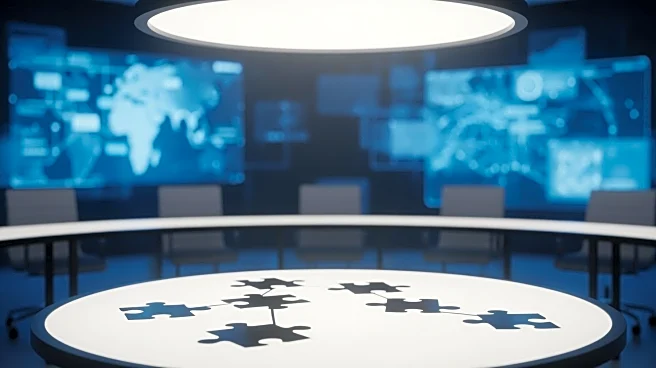What's Happening?
The U.S. coordination center in Kiryat Gat, Israel, has been criticized for its lack of formal Palestinian representation, which some diplomats and aid organizations believe could hinder President Trump's efforts in the region. The center, which is involved
in civil-military coordination, is structured with Israeli officials on the first floor, international organizations on the middle floor, and U.S. military officers on the top floor. The center's activities are overseen by Aryeh Lightstone, an adviser to the Trump administration, and Steven Fagin, former U.S. ambassador to Yemen. The center aims to rebuild Gaza following the recent conflict, with initiatives such as establishing a Palestinian police force. However, the absence of Palestinian voices has raised concerns about the effectiveness of these efforts.
Why It's Important?
The criticism of the U.S. coordination center highlights the complexities of international efforts to stabilize Gaza. The lack of Palestinian representation could undermine the legitimacy and effectiveness of reconstruction efforts, potentially leading to further instability. The center's activities are part of a broader U.S.-led initiative to oversee humanitarian aid and reconstruction in Gaza, which is crucial for the region's recovery. The involvement of high-profile figures from the Trump administration underscores the political significance of these efforts. The success or failure of the coordination center could have lasting implications for U.S. foreign policy in the Middle East and the broader geopolitical landscape.
What's Next?
The coordination center is expected to continue its efforts to rebuild Gaza, with potential adjustments to address the criticism regarding Palestinian representation. The U.S. and its allies may need to engage more directly with Palestinian leaders to ensure the effectiveness of their initiatives. The center's activities will likely be closely monitored by international stakeholders, and any changes in its approach could influence the broader peace process in the region. The upcoming announcements regarding the Board of Peace and other strategic decisions will be crucial in shaping the future of Gaza and the role of the U.S. in the Middle East.















